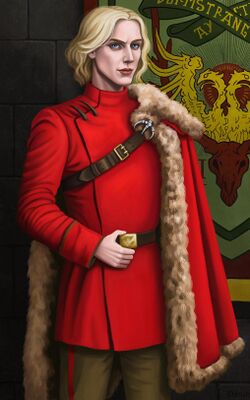Sandor I
| Sandor I | |
|---|---|
 | |
| Holy Aurucolian Emperor | |
| First reign | 13 April 1801 – 8 August 1824 |
| Coronation | 19 April 1801, Saint Zalán Cathedral |
| Predecessor | Domonkos III |
| Successor | Matthijs IV |
| Second reign | 20 March – 22 June 1825 |
| Successor | Matthijs IV |
| King of Bahatstva | |
| Reign | 5 May 1803 – 8 August 1824 |
| Predecessor | Lyubomyr VI |
| Successor | Lyubomyr VI |
| Viceroy | Krisztián Takács de Mosonmagyaróvár |
| Grand Prince-Elector | |
| Reign | 7 September 1798 – 13 April 1801 |
| Predecessor | Position established |
| Successor | Position abolished |
| Born | Sándor Roskoványi de Berettyóújfalu et Tótkomlós 14 September 1769 Veszprém, Magyaria, Aurucolia |
| Died | 12 February 1835 (aged 65) Saint Helena |
| Spouse |
|
| House | Roskoványi |
Sándor Roskoványi de Berettyóújfalu et Tótkomlós (14 September 1769 – 12 February 1835) was an Aurucolian political and military leader that reigned as the n-th Emperor of Aurucolia. Reigning as Sandor I, he transformed Aurucolia into a regional power that disrupted the status quo in Scandinavia and Zumeria.
Sandor was born to relatively major noble family in Veszprém. At the age of 8, he moved to Nyireghaz, where he enrolled in its military academy. He supported the liberal Domonokians during the Csatarian War, where he fought as an officer in the Hussars of the Holy Imperial Guard. After the 1 September Coup, Sandor was appointed Grand Prince-Elector of Holy Imperial Electoral College which gave him a substantial amount of political power. Sandor was proclaimed emperor on 13 April 1803, with his coronation occurring 6 days later.
Sandor would go on to fight in a series of conflicts which dominated his reign. He was exiled to [a Remiferian island] following his abdication on 8 August 1824. He returned from exile to oust his successor Matthijs IV, and fight the Hundred Days Campaign to reassert his authority. After the defeat at Nederborg, he was dethroned and exiled to Saint Helena where he later died.
Sandor endorsed liberal policies, while preserving the authority of the Catholic Church.
Early life
Early military career
Sandor enlisted in the 3rd Regiment of the Hussars of the Holy Imperial Guard after graduating from the Academy. During the Csatarian War, he led a decisive cavalry charge during the Battle of Törökdány, in which he broke the Csatarian center.
Grand Prince-Elector
Sandor, intrigued with politics, was appointed a member of Domonokos's court.
After instability within the Prince-Electoral College climaxed, Domonokos decided to forcibly remove several members from the college under the advice of Sandor. This event would become known as the 1 September Coup.
Afterwards, Domonokos promoted Sandor to the newly-created position of Grand Prince-Elector, whereupon his vote is worth seven individual votes.
Holy Aurucolian Emperor
Domonokos and his son were assassinated by Csatarian loyalists on 1 April 1803.
On 13 April 1803, on his declaration in the Electoral College, Sandor was proclaimed Holy Aurucolian Emperor.
Sandoric Wars
After being crowned King of Bahatstva as a consequence of the ousting of Lyubomyr VI, Scandinavia and Zemuria were in uproar. This lead to the War of the Third Coalition.
